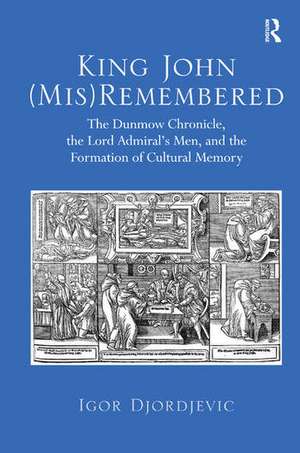King John (Mis)Remembered
Autor Igor Djordjevicen Limba Engleză Hardback – 28 iul 2015
| Toate formatele și edițiile | Preț | Express |
|---|---|---|
| Paperback (1) | 389.38 lei 6-8 săpt. | |
| Taylor & Francis – 12 dec 2019 | 389.38 lei 6-8 săpt. | |
| Hardback (1) | 766.12 lei 6-8 săpt. | |
| Taylor & Francis – 28 iul 2015 | 766.12 lei 6-8 săpt. |
Preț: 766.12 lei
Preț vechi: 1028.54 lei
-26% Nou
Puncte Express: 1149
Preț estimativ în valută:
146.62€ • 151.46$ • 122.02£
146.62€ • 151.46$ • 122.02£
Carte tipărită la comandă
Livrare economică 26 martie-09 aprilie
Preluare comenzi: 021 569.72.76
Specificații
ISBN-13: 9781472462046
ISBN-10: 1472462041
Pagini: 216
Ilustrații: Includes 6 b&w illustrations
Dimensiuni: 156 x 234 x 19 mm
Greutate: 0.56 kg
Ediția:New ed.
Editura: Taylor & Francis
Colecția Routledge
Locul publicării:Oxford, United Kingdom
ISBN-10: 1472462041
Pagini: 216
Ilustrații: Includes 6 b&w illustrations
Dimensiuni: 156 x 234 x 19 mm
Greutate: 0.56 kg
Ediția:New ed.
Editura: Taylor & Francis
Colecția Routledge
Locul publicării:Oxford, United Kingdom
Cuprins
Reclaiming John from the monks. Ground zero: Peele, Shakespeare, and the birth of the topical cluster. John Stow at the crossroads of memory, legend, and theatrical history. Munday's alternate history and the topical cluster of King John. The sexy side of history and the specter of bastardy: Look About You. Historical poesy strikes back. Dunmow Redivivus: Vallans, Daniel, and Davenport. Connecting the dots: the long shadow of Dunmow.
Notă biografică
Igor Djordjevic is Associate Professor of English at York University, Canada. He is also the author of Holinshed's Nation (2010).
Recenzii
"Djordjevic succeeds in offering a convincing and interesting explanatory model, grounded in a thorough analysis of familiar and obscure texts alike, for shifting popular views of a notorious medieval monarch several centuries after his death." – Lindsay Diggelmann, The University of Auckland.
Descriere
Tracing the story of King John’s enshrinement as a villain in cultural memory, Igor Djordjevic focuses on the relationship of poet-playwrights Michael Drayton and Anthony Munday with John Stow, antiquarian discoverer and disseminator of the Chronicle of Dunmow; and the relationship of all three with the Lord Admiral’s Men. Djordjevic follows the cultural ripples of their collaboration to the end of the seventeenth century, revealing profound repercussions for a nation’s cultural memory.
